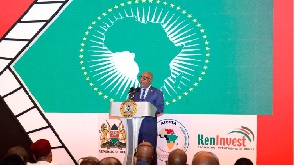Last week the African Union took issue with the persistent downgrades on African country’s credit ratings by Fitch, Standard and Poor’s, and Moody’s agencies, which have made it expensive for nations to issue sovereign bonds in the global markets.
The continental body said Western rating agencies are “unfair and ill-informed” on their continual low credit assessment of Africas’ economies, and mooted creation of a credit-rating agency from the continent.
Kenyan President William Ruto too protested Moody’s move to question Nairobi’s plan to buy back part of its $2 billion Eurobond that’ll be maturing in June 2024, which the rating agency says it might treat it as a default.
Kenya’s credit rating has been downgraded by all top three agencies this year on concerns over the country’s long-term debt servicing capacity and liquidity risks, making it even harder for Kenya to access financing on global markets.
African leaders have criticised the rating agencies for what they deem as an overstatement of the risks in their countries, which increases the cost of foreign-currency denominated bonds.
Macky Sall, President of Senegal and immediate former chair of the AU, last year in a speech at the UN noted the perception of risks of investing in African countries’ sovereign bonds “continues to be much higher than the actual risk.”
But will an autonomous arm of the AU established primarily to ‘accurately’ rate African countries’ risk levels do any good to efforts by countries to issue sovereign bonds at favourable terms?
Experts say not in the foreseeable future.
“In the short-term, I don’t think this will solve anything because whichever agency is giving the ratings, it has to be first of all credible to investors,” said Sunil Sanger, managing director of Orion Advisory Services.
“These Moody’s, Standard and Poor’s, and Fitch agencies, they’ve been around for many years and are accepted as being independent in their rating. They’ve all made mistakes, but investors still trust them and believe that they’re not on any agenda.”
Sanger argues that an AU-backed agency may take long before its assessments are trusted by global investors.
According to Kenyan economist Kwame Owino, international agencies base their ratings on actual risks that they see in a country, which may result from rising interest rates, dwindling reserves, unstable government finances and political tensions.
“I’m not sure what specific insights this Pan-African rating agency will have that the global firms don’t have or what it will do differently. The competition is okay, but I’m not too sure what it will change,” said Owino.
He argues that to attract better ratings and turn investor sentiments in their favour, African countries need to look inwards and improve their economic policies to ensure stability, rather than point an accusing finger at rating agencies.
“It’s basically the proper market signals that show people you have sufficient revenues to be able to pay for your debts,” said Owino.
"And that when you borrow money it goes to the right things, so the government is not stuck,” he said.
Africa News of Monday, 14 August 2023
Source: theeastafrican.co.ke

















